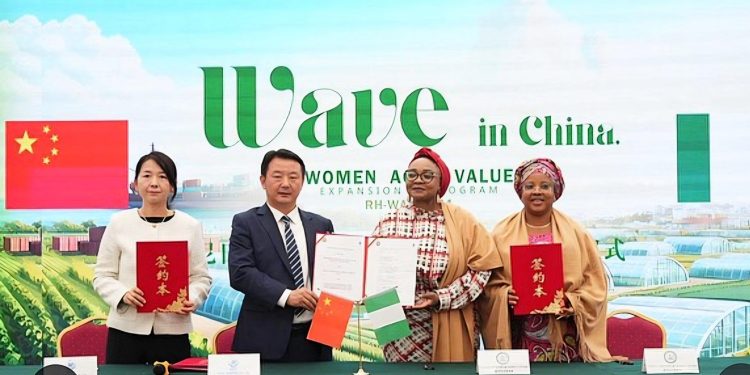Nigeria’s Minister of Women Affairs and Social Development, Hajiya Imaan Sulaiman-Ibrahim, has embarked on a series of high-level engagements with Chinese government and institutional leaders to strengthen bilateral cooperation in women’s economic empowerment, agriculture, and social protection.
The meetings took place on the sidelines of the Beijing+30 Global Women’s Summit, where the Minister reaffirmed Nigeria’s renewed commitment to strategic international partnerships that support inclusive development.
During a courtesy visit to Mrs. Yang Andi, Deputy Governor of Jilin Province, Sulaiman-Ibrahim highlighted the strong economic foundation between both regions.
“Our discussion confirms an existing trade volume of 150 million USD between Jilin and Nigeria , a potent foundation we are ready to scale,” she said.
“The presence of a woman like Her Excellency Mrs. Yang Andi in powerful provincial leadership is a compelling testament to the role women play in global governance.”
According to the Minister, the engagements mark a major step in advancing President Bola Ahmed Tinubu’s Renewed Hope Agenda, which seeks to empower 10 million Nigerian women as economic catalysts by 2030.
“This partnership is smart economics. By activating it, we are set to empower 10 million Nigerian women, dramatically boosting local impact and moving Nigeria closer to its $1 trillion economy goal,” she stated.
At the center of this drive is the WAVE Model , Women’s Advancement through Value creation and Empowerment, a strategic framework designed to help women build wealth, enter agribusiness, and lead as value creators.
Recognizing that women constitute nearly 70% of Nigeria’s smallholder farmers, the Minister emphasized the need to remove barriers such as lack of finance, equipment, and training. To address this, Nigeria signed a Memorandum of Understanding (MoU) with the Mutual Commitment Group (MCG), a Chinese company focused on inclusive infrastructure and agricultural innovation.
“This strategic alliance will deliver the vital equipment, training, and resources Nigerian women need to thrive in agriculture,” she noted.
She also praised the Chairman of the House of Representatives Committee on Women Affairs for her support, calling it “a dedication to advancing Nigerian women.”
The delegation held a trilateral dialogue at Jilin Agricultural University focused on agricultural science, education, and technology transfer. The discussions explored sustainable ways to strengthen cooperation in human capacity development and food security.
Jilin University shared insights from its “Science and Technology Yard” model in Zambia, which integrates agricultural training directly with community needs.
“We explored sustainable ways to strengthen Nigeria–China agricultural collaboration, with a shared vision to build human capacity, transfer technology, and enhance food security,” the Minister said.
A joint proposal was introduced under the Four-Floor Agenda for Women, supporting training, research collaboration, and agricultural value chain innovation.
In Changchun, the Nigerian delegation visited Dikeng Medical Centre, where Sulaiman-Ibrahim highlighted the importance of community-centered care.
“This confirmed our vision that community-centric care is the key to national wellbeing,” she said.
An additional MoU with the Mutual Commitment Company will establish Safe Spaces and Referral Services across all 774 local government areas in Nigeria, alongside Mega Modern Sexual Assault Referral Centres (SARC) in each geopolitical zone.
“Safeguarding the health and wellbeing of women and children is our absolute priority. This is a deep-rooted investment in the future health and security of our nation.”
She further emphasized universal access to help and protection services, noting that technical support will be deployed nationwide.
The Minister reiterated that all initiatives launched during the China visit align with the Renewed Hope Agenda’s goal of placing women at the center of economic transformation.
“From experiencing healing in China to enabling national healing in Nigeria, the work begins now.”
Through cross-border alliances and investments in agriculture, social infrastructure, and technology, Nigeria is translating policy into practical impact, ensuring women are not at the margins of prosperity, but leading it.










